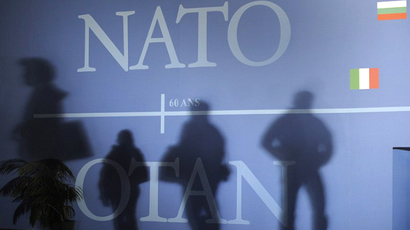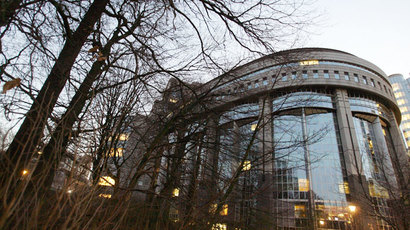Merkel rival threatens to scupper EU-US trade talks over NSA spying
Peer Steinbruck, leader of the Social Democrats, and Angela Merkel’s main rival in next month’s election, says he will delay EU trade negotiations over the NSA bugging of German government offices.
Peer Steinbruck has said that if he wins the election on the 22nd September he will freeze EU-US trade talks.
“I would interrupt the negotiations until the Americans say if German government offices and European institutions are bugged or wiretapped. We don’t know if the Americans may be sitting under our desk with some technical devices,” he told ARD TV.
RT’s correspondent in Berlin, Peter Oliver, says that Peer Steinbruck is the only candidate that has a chance of challenging Angela Merkel in the upcoming elections.
“This is one of the only issues that the opposition can attack Merkel on. She remains incredibly personally popular and is expected to be returned as chancellor, but if Steinbruck is to get there, this is the option to go for,” said Oliver from Berlin.
Oliver added that as the chancellor the buck stops with Merkel over the NSA spying allegations. According to the leaked documents provided by Snowden and published in Der Spiegel not only did Merkel know what the American’s were doing but the German security services actually helped them.
When the scandal initially broke in July, Merkel said she had no knowledge of the German intelligence agency the BND’s cooperation with the NSA, and that she had only found out about it through press reports.
Steinbruck’s comments come after Der Spiegel, a weekly German magazine, reported that the NSA bugged the United Nations in New York, as well as the EU and the International Atomic Energy Agency (IAEA) in Vienna.
Files obtained by Der Spiegel, which had been leaked by Edward Snowden, showed that the NSA has a special program on surveillance in more than 80 embassies and consulates worldwide known as the ‘Special Collection Service’, and spied on the EU’s New York headquarters when they moved to new offices in 2012.
The United Nations said on Monday that it plans to contact the US over the allegations in a clear warning that countries are meant to respect the UN’s diplomatic immunity.
“We’re aware of the reports and we intend to be in touch with the relevant authorities on this. Member states are expected to act accordingly to protect the inviolability of diplomatic missions,” Farhan Haq, a UN spokesman, told reporters.
He continued that the UN was protected under the 1961 Vienna Convention governing diplomatic relations.

Privacy conscious Germany, which has a painful history of surveillance both under the Nazis and the Stassi in communist East Germany, has been outraged at Snowden’s revelations and the resulting distrust of the government has put in doubt Markel’s bid to retain the chancellorship on September 22.
At a recent rally Merkel struggled to make herself heard over chants of “hypocrite” and “liar” by opponents worried about their US allies’ spying.
Merkel tried to allay fears earlier this month by saying that US and British intelligence agencies had observed German laws while operating in Germany. But critics have said that German online communication data in any case goes through the servers of Google, Facebook and Microsoft in the USA and is not subject to German law.
Germany’s independent privacy watchdogs have said that the NSA surveillance programs are in breach of an EU-US pact, which was signed to ensure cross border protection.
“We’re just at the beginning of the debate. The assurances [by Merkel] do not refer to data taken from American servers,” said Frank-Walter Steinmeier of the Social Democrats last week.
Earlier this month it was announced that the US and Germany would hammer out a ‘no spy’ pact. Angela Merkel’s chief of staff, Ronald Pofalla, told a parliamentary committee that the two nations would begin talks on a bilateral agreement.
He insisted to lawmakers that the government had been given
assurances by the UK and US intelligence agencies that the basic
rights of millions of Germans are not being violated and that
that no system of comprehensive wiretapping and spying by foreign
powers exists in Germany.
Meanwhile German email providers are enjoying a jump in their
sales following the NSA data scandal, reports Der Spiegel. German
companies have beefed up their security features thanks in part
to the country’s strict privacy laws they are promoting their
accounts as some of the most secure in the world.
Deutche Telecom earlier launched an initiative earlier this month
in which three of its email services, T online, GMX and web.de do
not leave local servers. The provider’s emails are encrypted and
users are notified when they are writing an email to someone who
does not fall under the company’s protection.














